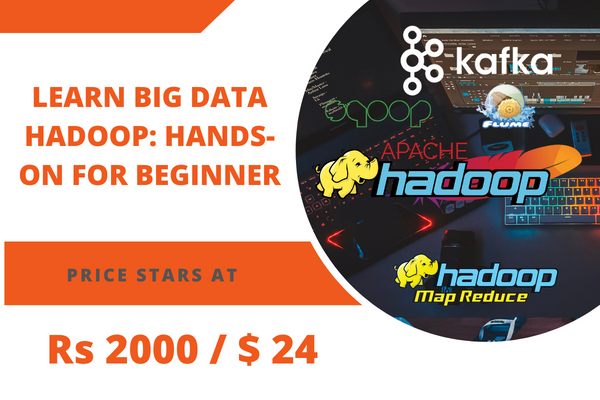Are you ready to step into the world of Big Data and build a strong foundation in Hadoop and its ecosystem tools? This course is designed for absolute beginners and aspiring data engineers who want to gain practical, hands-on experience in working with Apache Hadoop, HDFS, YARN, MapReduce, and related Big Data tools like Hive, Pig, Sqoop, Flume, and Kafka.
With the explosion of data in today’s digital world, organizations across industries—from e-commerce and telecom to banking and healthcare—rely on Big Data technologies to store, process, and analyze massive volumes of structured and unstructured data. Hadoop has become one of the most important and in-demand technologies for managing Big Data. This course will help you learn Hadoop step by step—from basics to advanced concepts—through real-world examples, command-line practice, and live hands-on demos.
By the end of this course, you will have a solid foundation in Big Data concepts, Hadoop ecosystem tools, and their applications in real projects—making you job-ready for roles such as Big Data Engineer, Hadoop Developer, Data Analyst, or Data Engineer.
What You Will Learn in This Course
Big Data Fundamentals
- Understand what Big Data is, its characteristics (Volume, Variety, Velocity), and why it matters.
- Explore the challenges of traditional systems and how Hadoop solves them.
- Learn the roadmap to becoming a Big Data Engineer.
Apache Hadoop Basics & Installation
- Introduction to Hadoop, its ecosystem, and use cases.
- Differences between Hadoop vs RDBMS, Data Warehouse, Teradata.
- Step-by-step installation of Hadoop 3.3.0 on both Windows and Ubuntu Linux.
- Learn to set up and manage a single-node Hadoop cluster.
HDFS (Hadoop Distributed File System)
- Learn the architecture and components of HDFS.
- Hands-on practice with 70+ HDFS commands (mkdir, put, get, ls, chmod, setrep, fsck, and more).
- Explore replication, snapshots, rack awareness, and cluster robustness.
YARN (Yet Another Resource Negotiator)
- Understand YARN architecture and how it manages cluster resources.
- Learn about schedulers, NodeManager, ResourceManager, and monitoring with YARN Web UI.
MapReduce Programming
- Learn the core data processing model in Hadoop.
- Understand concepts like Mapper, Reducer, Shuffle & Sort, InputSplit, RecordReader, Partitioner, and Counters.
- Build and run MapReduce examples with hands-on demos.
Apache Pig
- Introduction to Pig and its comparison with MapReduce.
- Learn Pig Latin scripting and its operators (FILTER, JOIN, GROUP, UNION, SPLIT, etc.).
- Hands-on practice with Pig built-in functions (AVG, SUM, COUNT, MAX, MIN, LOG, etc.).
- Debugging and real-world scenarios with Pig scripts.
Apache Hive
- Learn Hive architecture and how Hive queries are executed.
- Installation and setup using Docker Desktop.
- Hive Data Models: Tables, Partitions, Bucketing, and Data Types.
- Hands-on with DDL & DML (CREATE, LOAD, SELECT, INSERT, UPDATE, DELETE).
- Work with managed & external tables, partitions, and bucketing.
- Explore Hive functions and integration with Hadoop ecosystem.
Apache Sqoop
- Learn to import/export data between Hadoop (HDFS/Hive) and RDBMS systems (MySQL).
- Hands-on with Sqoop import/export, incremental import, free-form queries, and compression techniques.
Apache Flume
- Introduction to data ingestion using Apache Flume.
- Learn its architecture, features, and real-world applications.
- Hands-on configuration and example data flow.
Apache Kafka
- Understand real-time event streaming and messaging concepts.
- Learn Kafka’s architecture: Producers, Consumers, Brokers, Topics, and Partitions.
- Hands-on: Install Kafka, create topics, produce and consume messages.
- Work with Kafka CLI tools and perform topic operations (create, delete, modify, describe).
Python with Databricks (Bonus Section)
- Introduction to Python programming essentials (variables, loops, functions, collections).
- Learn the basics of Python for Data Engineering in a Databricks environment.
What will students learn in your course?
- Understand the fundamentals of Big Data, its characteristics (3Vs), challenges, and applications in real-world industries.
- Learn Hadoop basics, its ecosystem, use cases, and how it compares with RDBMS, Data Warehouse, and other systems.
- Install and configure Apache Hadoop 3.3.0 on both Windows 10 and Ubuntu Linux (single-node cluster setup).
- Master HDFS (Hadoop Distributed File System) with 70+ hands-on commands to store, manage, and process data.
- Gain a deep understanding of HDFS & YARN architecture including NameNode, DataNode, ResourceManager, NodeManager, and data replication.
- Learn and practice MapReduce programming concepts such as Mapper, Reducer, Shuffle, Sort, InputSplit, RecordReader, and Partitioner.
- Work with Apache Pig: Pig Latin scripting, operators, built-in functions, and data transformations with hands-on exercises.
- Learn Apache Hive: Hive architecture, data models, DDL & DML operations, partitions, bucketing, managed vs external tables, and functions.
- Import and export data between Hadoop and MySQL using Apache Sqoop (including incremental imports and exports).
- Ingest streaming data using Apache Flume and understand its architecture, features, and real-world applications.
- Get hands-on with Apache Kafka: installation, producers, consumers, topics, partitions, CLI tools, and topic operations.
- Gain practical experience with Big Data tools through real-world commands, labs, and use cases.
- Learn Python basics in Databricks to support Big Data workflows and data engineering tasks.
- Prepare for Big Data & Hadoop interviews with FAQ and scenario-based questions.
